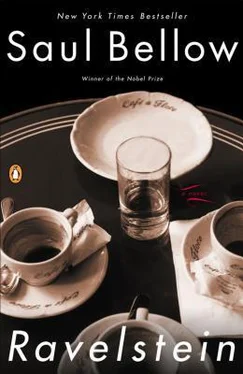"All right. How do you want it drawn?"
"Make it out to cash."
There was no need to ask Ravelstein to elaborate. "I've written the address out," he said, and handed me a slip of paper.
"Consider it done."
"I'll cut you a check."
"Don't give it a thought," I said.
I wondered whether some visitor hadn't pinched a cigarette lighter or some other _bibelot__, and Ravelstein was paying ransom. But I decided it wasn't worth pursuing. He had already told me about his sharp increase in sexual feeling. He'd say, "I feel hot, and what am I supposed to do with it? And some of these kids have a singular sympathy with you. They've got the complete picture. I would never have expected death to be such a weird aphrodisiac. I don't know why I'm unloading this on you. Maybe I think this is in formation you should have."
I have a life-time habit of putting things off. Of course I knew Ravelstein was in the end zone, that he didn't have long to live. But when Nikki told me that Morris Herbst was coming to town I felt I was on notice to pull myself together.
Ravelstein and Morris Herbst were on the phone every day. With Ravelstein's assistance, Morris, a widower, had managed to bring up two children. Ravelstein was, somehow, in love with their late mother, and spoke of her with singular respect and admiration. He described to me her "dramatic white face, black eyes, a beautiful and sexually open but not promiscuous nature." Nothing in the sexual line is prohibited anymore, but the challenge is to hold your own against the general sexual anarchy. Ravelstein admired Herbst's late wife, loved her. She was the one woman whose photograph he carried in his wallet. So it was entirely natural that he should be a second father to her children. He dug up scholarships and found campus jobs for them, vetted their friends, and made certain that they read the essential classics.
It was Nikki who told me about the photo of Nehamah. "It's there with the credit and Blue Cross cards," he said. "You know that he goes for people who have basic passions-who make the tears come to his eyes. With Abe that counts more than anything."
If Ravelstein didn't often talk about Nehamah Herbst the reason was that in the last months of her life, he and Morris had built a cult of sorts around her. Abe had spent much time with her in the final weeks, and she had spoken freely about secret and intimate matters. Though he couldn't be trusted to respect confidences, he never told me what he and Nehamah had talked about.
Nehamah's mother came over from Mea Sha'arim and begged her daughter to have an orthodox ceremony performed.
"What, on my deathbed?"
"Yes. For the sake of your children you must. I am here to save them."
But one almost never gets the real thing, Ravelstein sometimes said. What truly matters has to be revealed, never performed. But only a handful of human beings have the imagination and the qualities of character to live by the true Eros. Nehamah not only refused to see the orthodox rabbi her mother had brought to her deathbed, but never spoke to her again, and without her daughter's goodbye the old woman flew back to Mea Sha'arim. "Nehamah was pure and she was immovable," Ravelstein said in the low voice of infinite respect.
I am trying as well as I can to transmit the singular connection between Ravelstein and Morris Herbst. For thirty or forty years they were in daily contact. "Now that there is moolah for every purpose, I have the satisfaction of being in touch, of talking to Morris without a thought of the expense," Ravelstein told me. Anyway, he never opened the telephone bills, Nikki said. Those were paid by Legg Mason, the vast investment firm in the East that managed his money. Abe told Nikki, who opened the mail, "I don't like the electronic printouts, I'm certainly not about to study them. Don't bring anything up, don't hand me a statement unless the principal falls below ten million." Here, Nikki's oriental reserve was blown away. He couldn't stop laughing. "Not a penny less than ten big ones," he said. He was open with me because I never pressed him-we never spoke of money. He would have been-let's see, now, what would he have been? "Affronted" is the suitable word. He had his own kind of princely Asiatic mildness, but if you were to offend him Nikki would tear your head off.
Morris Herbst, to get back to him, was at the top of Ravelstein's guest list for every conference he organized. He was the first to be invited and the first to accept. He read a paper at each and every one of Ravelstein's events. He had a reflective, settled, stable air and spoke deliberately without hurry or nervousness. With his square white beard-no mustache-he had the look of a Michigan farmer I had known fifty years ago. Herbst too had studied with Professor Davarr, but without Greek he could never call himself a genuine Davarr product. He taught Goethe, he had written a book about _Elective Affinities__, but the curious fact was-and there were always curious facts-he had a weakness too for cards and dice and was often in Las Vegas. Ravelstein had an extra-high regard for reckless plungers. And I too had a good opinion of Herbst. I couldn't say why. He gambled, he lost his head when he played Twenty-one, and though he mourned his wife he also chased women, but he never made any false claims about himself.
Yes, he had kept the family, just as he promised Nehamah, but the children knew all the details of his womanizing, his love affairs. There was always some lady or other camping in the house after Nehamah died, and women telephoned him from all parts of the country. He had a calm manner-a four-square way of sitting tight. His white hair was both curly and wavy and his color high. He looked well but he owed his life to cardiac surgery. And when you put a question to him, you had to wait while he organized his answer. He might sit tight, considering his reply (several times I clocked him) for as long as five minutes. He was a sober and circumspect conversationalist. German-born, he specialized in Ger man thinkers. He was never as keen on them as he was on women but since the death of his wife he had had one durable love affair with a woman whose none-too-patient husband had to put up with their long nightly telephone calls. Without the telephone, what would Morris's spiritual life have been? Ravelstein preferred the French expression. He said "I wouldn't call Morris a chaser. He's a real _homme а femmes__. If it's not a vocation, it's nothing."
Five years ago, the surgeons had told Herbst his heart was used up. He was wait-listed for a transplant with a very high priority. He had no more than a week to go when a motorcyclist from Missouri was killed in a crash. The boy's organs were harvested. Technically these transplants are an immense achievement. The human side of the thing is that Morris carries another man's heart in his chest. One might accept a skin graft from a compatible stranger. But the heart, we would be inclined to agree, is a different matter. The heart is a mystery. If you've seen your own heart on a video screen, as millions by now have done, convulsing and opening rhythmically, you may have wondered why this persistent muscle is so faithful in its function from the uterus to the last breath. This rhythmic gripping and relaxing blindly goes on. Why? How? And who was it now that prolonged Morris Herbst's life-a harum-scarum adolescent speed demon from Cape Girardeau, Missouri, about whom Herbst knew nothing. Nothing fits here except the old industrial slogan: "The parts are interchangeable." This brings modern reality home to us.
During the war, it often came home to me that the Russian troops driving Hitler's army back through Poland did it all on canned pork from Chicago.
Why pork? Well, it is appropriate in this case. Morris was a believing Jew-not fully orthodox but more or less observant. And this freestyle Jew owes his existence to the heart from the bosom of a young man who lost control of his bike-I don t know the actual circumstances of his death. All I really know is that surgical technicians took out the boy's heart and it now replaced the faltering heart in Herbst's breast. Herbst would tell me that it brought foreign impulses and sensations into his life.
Читать дальше












